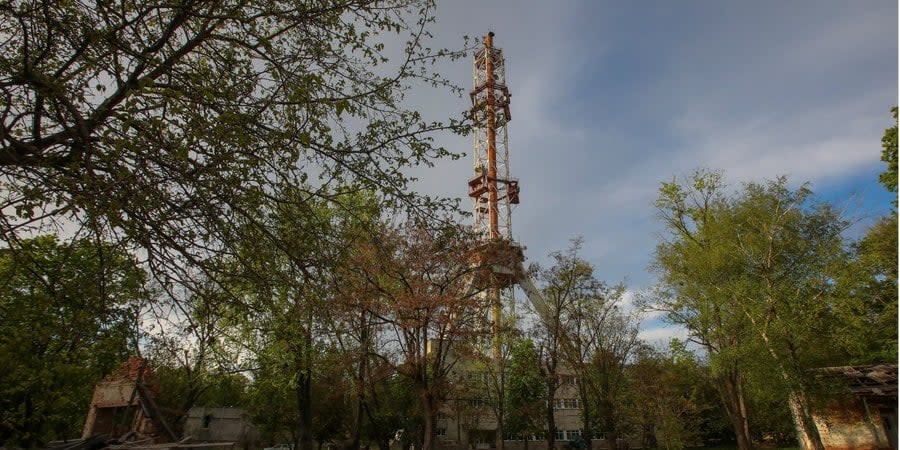ISW uncovers Russia's strategy to gradually destroy Kharkiv’s infrastructure, spread outsized panic

The Kremlin is conducting a campaign of air strikes coordinated with information operations to destroy Kharkiv, convince Ukrainians to flee the city, the U.S.-based Institute for the Study of War said in its April 22 report.
This tactic intends to make millions of people more internally displaced ahead of a possible future Russian offensive on Kharkiv or elsewhere in Ukraine.
After the X-59 missile strike that destroyed the Kharkiv TV tower on April 23, ISW experts noted that Russian state propaganda and “milbloggers” tried to justify the attack by claiming that Ukrainian forces had allegedly installed equipment for communication and air defense coordination on the tower. The Russian war correspondents also cynically rejoiced at the accuracy of the Russian strike on the TV tower, reminding that previous strikes on TV towers in Kharkiv, Sumy, and Chernihiv oblasts had not resulted in their destruction.
The ISW also recalls the Russian attack on a TV tower in Kyiv on March 1, 2022, an attack shortly after the start of the Russian invasion that is embedded in the memory of many Ukrainians. Therefore, experts suggest that now, with the attack on the TV tower in Kharkiv, the Kremlin may seek to “invoke the memory” of the first weeks of the invasion in order to sow panic among Ukrainians during a new difficult stage of the war.
Kremlin propaganda outlets are seizing on concerns about Russia’s upcoming offensive and its hypothetical plans for Kharkiv to conduct a coordinated information operation to stir up disproportionate panic among Ukrainians. ISW estimates that there is a “very low” likelihood of Russian success in a ground offensive against Kharkiv if Ukraine quickly receives additional U.S. military assistance.
The Ukrainian Center for Countering Disinformation under the National Security and Defense Council warned in February 2024 that Russian Telegram channels were spreading statements about the alleged flight of Ukrainian officials from Kharkiv, and Russian sources began claiming in early April that there was a “mass exodus” of civilians from Kharkiv.
Russian propaganda also tries to claim that Ukrainian officials are allegedly preventing civilians from leaving Kharkiv.
Read also: Russian strike breaks Kharkiv TV tower in half – Video
On March 28, Russian propagandist Vladimir Solovyov alleged that Russian troops should destroy Kharkiv “quarter by quarter” and suggested that the city’s civilians be asked to leave within 48 hours.
On April 16, the Russian neo-nationalist outlet Tsargrad published statements by several unnamed military sources that a Russian offensive to capture Kharkiv was imminent and that the situation in the city would be “worse than in Bakhmut and Avdiivka.” Fanning these fears, Tsargrad claimed that there was “no doubt” that Russia would capture the eastern Ukrainian city and that “blockade tactics” (including cutting off electricity, gas, and water to civilians) were the most “reasonable” way for Russian troops to capture the city.
Another prominent Russian “milblogger” said that Russia’s strikes on Kharkiv on April 22 were a sign that civilians should leave Kharkiv “while they still can,” hinting at further Russian strikes on the city’s residential infrastructure.
ISW continues to assess that the Russians lack the forces necessary to capture Kharkiv – as long as its Ukrainian defenders are properly supplied (and they should be, as the United States should soon resume military assistance to the Ukrainian Armed Forces, according to the Institute’s experts).
ISW experts also emphasize that the Russians are intensifying strikes on Kharkiv and information operations against its population to take advantage of the current deficit of Ukrainian air defenses and the period of heightened tension in Ukraine during what is likely to be a relatively short period before the expected arrival of U.S. military aid to the frontline areas.
In particular, Russian Foreign Minister Sergei Lavrov announced on April 19 that Russia was interested in an operation to capture Kharkiv, claiming that the city “plays an important role” in Russian dictator Vladimir Putin’s idea of creating a demilitarized “sanitary zone” in Ukraine, ostensibly to protect Russian border settlements from Ukrainian attacks. In Russia’s view, such a “sanitary zone” would apparently include a number of conditions ranging from the seizure of Kharkiv and its surrounding areas to the creation of an uninhabitable zone, a ruined “no man’s land” controlled by neither side.
Read also: Russia targeted Kharkiv TV tower moments before Zelenskyy-Biden call
The ISW estimated earlier that a Russian offensive aimed at capturing Kharkiv would be an extremely ambitious undertaking that would pose significant challenges to Russian troops. Analysts recall that in such a case, the Russian military command would likely have to revise the goals of its projected offensive efforts in the summer of 2024 to take into account the likely better equipment and manning of Ukrainian forces.
At the same time, the analysts suggest that Russian military commanders may try to destroy Kharkiv through air, missile, and drone strikes and provoke a large-scale internal displacement of Ukrainian civilians if the Russian military decides that it cannot succeed in capturing the city through ground operations. Continued timely military assistance from the United States and the West, including the provision of air defense systems and missiles to Ukraine, will be crucial to Ukraine’s defense of Kharkiv, ISW concludes.
We’re bringing the voice of Ukraine to the world. Support us with a one-time donation, or become a Patron!
Read the original article on The New Voice of Ukraine

